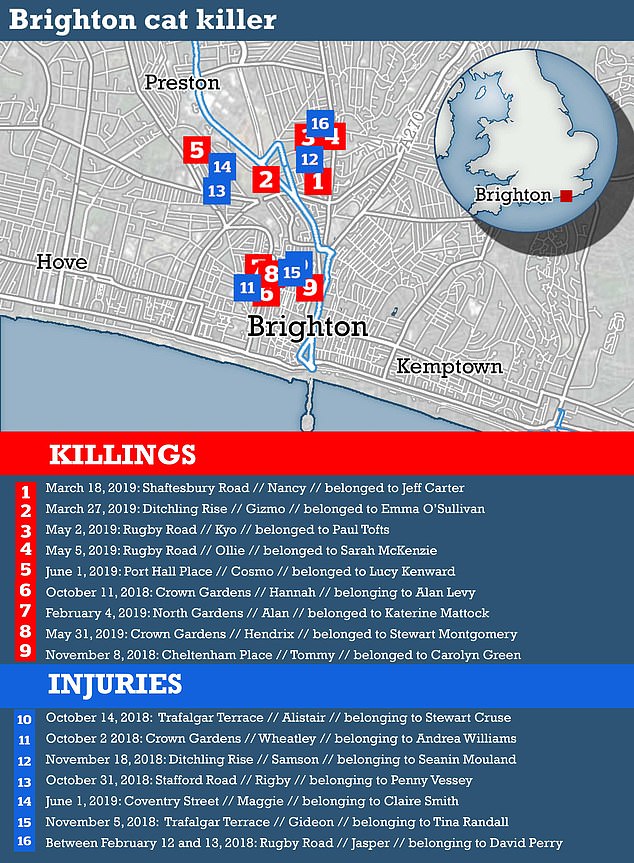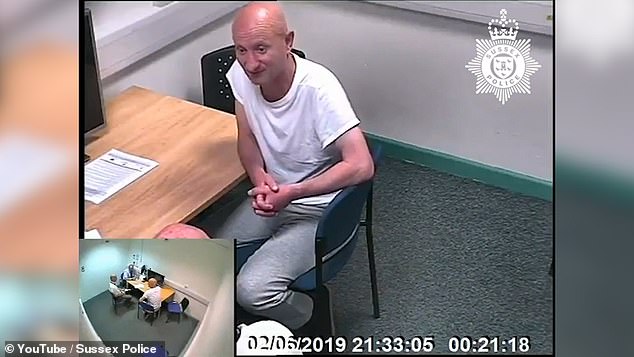
A former Royal Navy gunner dubbed the ‘Brighton cat killer’ died of Covid-19 on his 55th birthday – just months after being jailed for fatally stabbing nine pets during a seven-month spree.
Stephen Bouquet, who also injured seven other cats, was jailed for five years and three months in July 2021.
But on January 5, 2022 – just six months into his sentence – Bouquet died at Maritime Medway Hospital in Gillingham, Kent.
An inquest at County Hall in Maidstone, Kent today heard the former security guard had been diagnosed with thyroid cancer shortly after he was jailed.
He underwent a procedure to remove his thyroid gland at Guys and St Thomas’ Hospital in London on October 27, 2021 – but the disease had spread to his liver and lungs.
Senior Coroner Patricia Harding said this had left him ‘very emaciated’ and that he was ‘reaching the end of his life’.

Stephen Bouquet was jailed for five years and three months in July 2021
A statement from the Prison Ombudsman at HMP Elmley on the Isle of Sheppey, read to the inquest by Ms Harding, said when Bouquet was transferred to the prison on December 1, 2021, he was ‘frail with limited mobility and used a walking aid and wheelchair to get around.’
The inquest was told the nurse in charge of his care requested a referral for palliative support.
In the weeks leading up to his death Bouquet was admitted to hospital several times with respiratory and cardiac issues, as a result of his ongoing illness and a second diagnosis of Chronic Obstructive Pulmonary Disorder (COPD).
And on November 21, 2021, a Do Not Resuscitate order was put in place.
Bouquet was admitted to Medway Maritime Hospital for the final time on December 27, 2021 because his blood oxygen saturation levels were low and he had a persistent cough.
The following day, he tested positive for Covid-19.
On January 4, 2022, Bouquet was diagnosed with Covid-19 pneumonia and bacterial pneumonia – despite having received two vaccines and a booster for the viral disease.
He died at 9:50pm on January 5, 2022 – his 55th birthday.




In the weeks leading up to his death Bouquet was admitted to hospital several times with respiratory and cardiac issues, as a result of his ongoing illness and a second diagnosis of Chronic Obstructive Pulmonary Disorder (COPD)






Between October 2018 and June 2019, Bouquet stabbed at least 16 pet cats across the seaside resort, killing nine and seriously injuring seven
A post-mortem examination carried out on January 17, 2022 determined the cause of death to be Covid-19 pneumonitis and Chronic Obstructive Pulmonary Disorder.
The thyroid cancer diagnosis was given as a contributing factor.
The inquest heard it was not clear whether Bouquet contracted Covid-19 in prison or during one of his stays in hospital, but Ms Harding said she was satisfied HMP Elmley had sufficient measures in place to protect prisoners from the spread of the disease.
She gave a conclusion of natural causes.
Ms Harding said: ‘At the time of his referral to HMP Elmley, Mr Bouquet was extremely frail, he had poor mobility, he was vulnerable to infection and required support with all of his daily activities.
‘Given how advanced his cancer was, there were no further treatment options available.
‘In effect, the care he was being given was palliative.’
She continued: ‘He was formally diagnosed with Covid-19 at Medway Maritime Hospital.
‘Despite clinical management, he progressively deteriorated.
‘Sadly he was already frail with the cancer and he was too weak to fight the infection.
‘He died on January 5, 2022. His 55th birthday.
‘I am satisfied that natural causes were the cause of death in this case.’






An inquest at County Hall in Maidstone, Kent today heard the former security guard had been diagnosed with thyroid cancer shortly after he was jailed
Ms Harding extended her condolences to Bouquet’s brother, Jefferson Bennett, who attended the inquest in person.
Security guard Bouquet carried out his attacks on cats in Brighton, East Sussex, between October 2018 and May 2019.
During his trial at Hove Crown Court, jurors heard accounts from several pet owners who had found their cats bleeding on their doorsteps.
He was finally caught after the owners of a nine-month-old feline called Hendrix noticed a CCTV camera near to where their animal had been stabbed.
The device had been set up by a neighbour whose cat had suffered a similar fate a year earlier.
Police examined the footage, which had captured Bouquet bending to stroke the cat before taking something out of his rucksack and making a sudden jerk towards the animal.
During a search of his home, officers found a knife with feline blood on it and the 55-year-old’s DNA on the handle.
Bouquet, who served in the Royal Navy for 22 years – including in Northern Ireland and Iraq – was found guilty of 16 offences of criminal damage in relation to the animals, as well as possession of a knife.
The pets killed were named in court at the time as Hendrix, Tommy, Hannah, Alan, Nancy, Gizmo, Kyo, Ollie and Cosmo.
Source